Paul Ryan: Based on NeemTime research
Biography / Personal Details / Who is Paul Ryan
Paul Ryan is an American politician and economist best known for serving as the 54th Speaker of the U.S. House of Representatives from 2015 to 2019.
He was born on January 29, 1970, in Janesville, Wisconsin.
His full name is Paul Davis Ryan, and he is affiliated with the Republican Party.
Ryan is known for his conservative fiscal policies and role in shaping major tax and budget legislation.
He first entered Congress in 1999, representing Wisconsin’s 1st congressional district for two decades.
Paul Ryan holds a degree in economics and political science from Miami University in Ohio.
He gained national prominence as Mitt Romney’s running mate in the 2012 U.S. presidential election.
He is considered a leading figure in modern American conservatism, especially on entitlement reform.
Ryan has a reputation for being articulate, policy-driven, and image-conscious.
Outside politics, he is known for his commitment to physical fitness and his passion for bowhunting.
He is a devout Roman Catholic and frequently discusses faith’s role in shaping his values.
Since leaving Congress, he has worked in the private sector and as a board member for several institutions.
Paul Ryan is married and a father of three, with a public image rooted in family values.
He has authored books and opinion pieces reflecting on political leadership and national challenges.
Ryan remains a notable figure in American politics, often cited in discussions about the future of the GOP.
Background / Childhood / Early Life Highlights of Paul Ryan
Paul Ryan grew up in Janesville, Wisconsin, in a tight-knit Irish-American family.
He is the youngest of four children born to Paul Murray Ryan, a lawyer, and Betty Ryan, an interior designer.
Tragedy struck early in his life when his father died of a heart attack when Paul was just 16.
His father’s death profoundly influenced his worldview and work ethic.
He attended Joseph A. Craig High School in Janesville and was voted class president in junior year.
During high school, he worked part-time at McDonald’s and later as a fitness trainer.
He developed a strong interest in politics and economics as a teenager.
Ryan credits reading Ayn Rand’s Atlas Shrugged in high school as a major influence on his political philosophy.
He pursued higher education at Miami University in Ohio, where he studied under libertarian economist Richard Hart.
During college, he interned for Wisconsin Senator Bob Kasten, launching his political path.
He was a member of the Delta Tau Delta fraternity and an enthusiastic student of political science.
After graduation, he worked as a speechwriter and policy aide in Washington, D.C.
His early mentors included Jack Kemp, a former congressman and vice-presidential nominee.
Ryan returned to Janesville to run for Congress in his late twenties.
His upbringing in a working-class town shaped his views on responsibility and government.
Career / Other Work / Current Life Highlights of Paul Ryan
Paul Ryan was elected to the U.S. House of Representatives in 1998 at the age of 28.
He served as Chairman of the House Budget Committee from 2011 to 2015, championing deficit reduction.
Ryan became Speaker of the House in 2015 after John Boehner’s resignation and served until 2019.
As Speaker, he played a central role in passing the Tax Cuts and Jobs Act of 2017.
He advocated for reforming Social Security, Medicare, and Medicaid to reduce long-term debt.
In 2012, he was the Republican nominee for Vice President alongside Mitt Romney.
His career was marked by efforts to balance fiscal conservatism with political pragmatism.
After leaving Congress, Ryan joined the board of directors at Fox Corporation in 2019.
He also became a professor of practice at the University of Notre Dame in 2019.
Ryan is a partner at a private equity firm called Solamere Capital, co-founded by Mitt Romney’s son.
He launched the American Idea Foundation to support community-focused poverty solutions.
He has written op-eds and spoken publicly about the future of conservatism and political polarization.
Ryan has criticized the direction of the GOP under Donald Trump, calling for more policy-driven leadership.
He maintains a low public profile but remains influential in policy and economic circles.
As of now, he splits his time between political consulting, nonprofit work, and speaking engagements.
Dating History / Family Members / Personal Life of Paul Ryan
Paul Ryan married Janna Little, a tax attorney from Oklahoma, in 2000.
Janna holds degrees from Wellesley College and George Washington University Law School.
The couple has three children: Elizabeth, Charles, and Samuel.
Ryan is known to be a devoted family man who prioritizes time with his children.
He often commuted between Janesville and Washington, D.C., to be with his family.
His wife Janna comes from a politically connected family, with ties to Democratic lawmakers.
Ryan is a practicing Roman Catholic and has emphasized the role of faith in family life.
He enjoys outdoor activities like fishing and bowhunting with his children.
The Ryans maintain a private life in Janesville and rarely appear in tabloid or celebrity media.
Paul Ryan’s mother, Betty Ryan, played a significant role in raising him after his father’s death.
He once lived in a fraternity house in college but became more private as his political career advanced.
The Ryans have also supported Catholic charities and educational causes.
Janna Ryan reportedly stepped back from her legal career to focus on family.
Ryan has credited his wife for keeping him grounded and balanced during his time in politics.
Despite his high-profile career, Ryan has kept his marriage and family largely out of the spotlight.
Lesser Known Unknown Facts Trivia of Paul Ryan
Paul Ryan worked as a fitness trainer before entering politics and still follows a strict workout regimen.
He is a devoted fan of the band Rage Against the Machine, despite their opposing political views.
Ryan once claimed he could do the P90X workout at 6 a.m. daily while in Congress.
He has a deep love for bowhunting and goes on annual trips with close friends.
He required staff to read Ayn Rand during his early days in Congress but later distanced himself from her ideology.
Ryan once drove the Oscar Mayer Wienermobile during a summer job in college.
He has said he listens to Metallica and Led Zeppelin while lifting weights.
Ryan was named one of TIME’s 100 most influential people in 2011.
He is the first person from Wisconsin to be nominated for national office by a major party since 1924.
His Secret Service code name during the 2012 campaign was “Bowhunter.”
He has appeared on 60 Minutes, The Tonight Show, and other national media platforms.
He was voted “Biggest Brown-Noser” in his high school yearbook, which he later joked about publicly.
Ryan is left-handed but shoots and bows right-handed.
He enjoys reading books on economics, history, and conservative philosophy.
Ryan once gave a speech at the Republican National Convention while jet-lagged from a hunting trip in Alaska.
Paul Ryan Shirtless
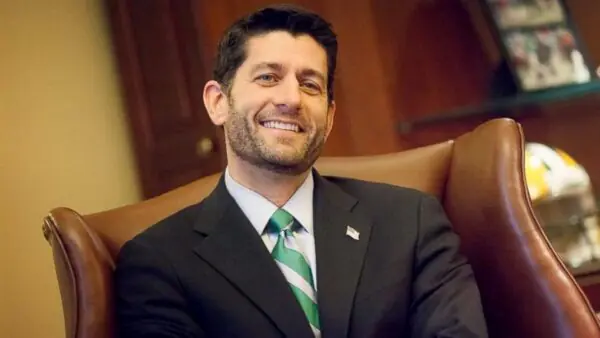
Paul Ryan Shirtless 5
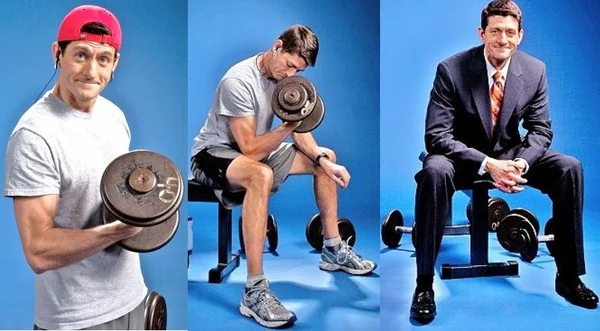
Paul Ryan Shirtless 3
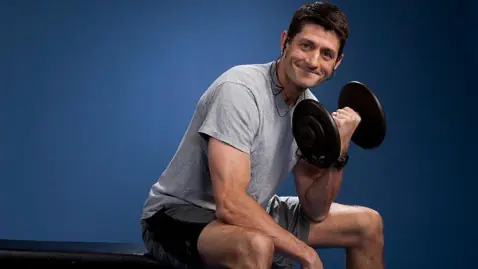
Paul Ryan Shirtless 2
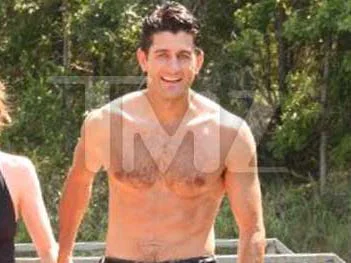
Paul Ryan Shirtless
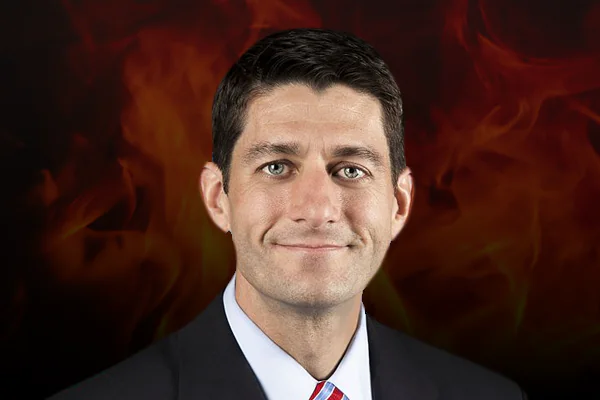
Paul Ryan Shirtless 4
Height / How to Get Body Like Paul Ryan
Paul Ryan is approximately 6 feet 1 inch tall, with a lean and athletic build maintained through disciplined training.
He famously followed the P90X extreme home fitness program during his time in Congress.
Ryan’s workouts emphasize high-intensity interval training, resistance exercises, and core strengthening.
He has spoken about starting workouts as early as 5:00 AM to fit fitness into his demanding schedule.
His routine often includes bodyweight exercises like pull-ups, push-ups, and jump squats.
Paul avoids heavy bulking and instead focuses on endurance, flexibility, and definition.
He maintains a relatively low body fat percentage by combining cardio, weights, and circuit training.
Ryan has said he avoids processed food, eats lean proteins, and practices portion control.
He has promoted fitness as a way to stay sharp and reduce stress during political life.
Paul prefers short, intense workouts that can be done with minimal equipment or at home.
He uses music to stay motivated, often training to classic rock or heavy metal playlists.
His workout philosophy reflects discipline, routine, and self-reliance, values he also applies in politics.
Ryan has been known to lead group workouts for fellow politicians and staffers during his time in D.C.
His physical fitness is part of his personal brand, often cited to emphasize vitality and stamina.
To get a body like Paul Ryan, focus on consistency, functional training, and smart eating—not gym extremes.
Interview Quotes of Paul Ryan (where/when)
“The way to solve our debt problem is to solve our health care problem.” — Fox News Sunday, March 2011
“I don’t want to be the guy who’s always complaining, I want to offer ideas.” — CBS This Morning, October 2015
“I think we should be inclusive, not exclusive, and govern based on ideas, not personalities.” — Meet the Press, January 2016
“Politics is not about taking it personally. It’s about getting things done.” — CNN Town Hall, August 2017
“I’m not going to defend the indefensible, regardless of party.” — Axios, May 2019, post-Speakership
“You can be conservative and compassionate at the same time.” — TIME Magazine, April 2012
“Entitlement reform isn’t easy, but it’s essential if we’re serious about the future.” — Wall Street Journal, November 2013
“I had my chance. I did what I could. Now I want to help in a different way.” — Politico Playbook, March 2020
“We need to disagree without being disagreeable.” — Harvard IOP Event, October 2021
“When we surrender policy for populism, we lose our compass.” — American Enterprise Institute Speech, February 2022
“Being Speaker wasn’t a dream job—it was a duty.” — ABC News Interview, December 2018
“Faith and reason should guide policy, not fear and resentment.” — Notre Dame Lecture, 2019
“I’m proud of the tax reform, even if it came with political costs.” — CNBC, April 2018
“I learned more from failure than success, and that’s what leadership requires.” — Aspen Ideas Festival, June 2021
“I want to raise thinkers, not partisans—that’s what I teach my kids.” — Milwaukee Journal Sentinel, November 2020
TV / Movie Quotes of Paul Ryan (where/when)
“This is a defining moment in our country’s history.” — RNC Speech, August 2012
“We’re not going to turn this into a mud fight; we’ll stay on policy.” — CNN GOP Debate, February 2012
“I’m not Mitt Romney’s attack dog—I’m his running mate.” — 60 Minutes Interview, August 2012
“Our rights come from nature and God, not from government.” — Republican National Convention, 2012
“You know what? I’m actually a numbers guy.” — The Daily Show, 2011 (guest appearance)
“What we’re trying to do is prevent America from going off a fiscal cliff.” — Face the Nation, January 2013
“I think Ayn Rand was right about the morality of capitalism.” — C-SPAN Q&A, 2005
“People want leadership. They don’t want slogans.” — NBC’s Meet the Press, September 2016
“It’s not about how you start; it’s about how you finish.” — PBS Frontline: The Choice 2012
“This is the moment to stand for the Constitution, not tear each other down.” — MSNBC Morning Joe, January 2017
“What I worry about is tribalism becoming stronger than truth.” — CNN Special Report, 2020
“I don’t want to be the loudest guy in the room—I want to be the smartest.” — Bloomberg TV, 2015
“Reagan was my inspiration, but I want to take it further.” — FOX Sunday Morning Futures, 2014
“I’m not running for president. I mean it this time.” — NBC Nightly News, April 2016
“This is not a time for cynicism—it’s a time for courage.” — CBS Face the Nation, January 2018
Controversies / Gossip / Scandals of Paul Ryan
Paul Ryan faced criticism for proposing Medicare reforms that Democrats labeled as “voucherizing” the program.
He was accused of hypocrisy for supporting tax cuts while promoting deficit reduction.
His admiration for Ayn Rand sparked controversy, especially among religious conservatives.
Ryan’s 2012 RNC speech drew widespread criticism for factual inaccuracies and exaggerations.
He was ridiculed for inflating his marathon time, later admitting he misstated it.
Some conservative commentators accused him of betraying the base for not fully supporting Donald Trump.
His departure from Congress in 2019 raised speculation about political disagreements with Trump-era GOP leadership.
As Speaker, Ryan was criticized for passing significant tax cuts without equivalent spending reductions.
He was seen by some as too passive during the rise of Trumpism, avoiding direct confrontation.
His appointment to the Fox Corporation board led to accusations of conflict, given his past critiques of partisan media.
Some accused him of distancing himself from controversial decisions he helped legislate, like the repeal attempt of the ACA.
Activists targeted Ryan for his alleged lack of action on gun reform after several mass shootings.
His budget proposals were controversial for proposing cuts to social programs while maintaining defense spending.
He drew backlash for endorsing Trump after criticizing him during the 2016 campaign.
Despite few personal scandals, Ryan remains a divisive figure due to his policy legacy and political positioning.
Why We Love Paul Ryan
Paul Ryan stands out for combining intellectual depth with Midwestern humility.
His passion for fiscal responsibility has shaped decades of conservative economic thought.
Ryan’s personal discipline, from fitness to fatherhood, reflects integrity and structure.
He values civil discourse, often urging respectful disagreement in a polarized era.
He balances traditional conservative values with a modern approach to governance.
Even critics admit his deep knowledge of policy and commitment to solutions.
His leadership as Speaker was marked by focus, calm under pressure, and strategic compromise.
Ryan’s devotion to family and community keeps him grounded beyond politics.
He has consistently supported education, opportunity, and civic participation.
His efforts to promote economic mobility and poverty reform show long-term thinking.
He’s transparent about personal mistakes, fostering trust in a skeptical public.
Ryan brings a rare blend of policy wonkishness and relatability to national dialogue.
He’s proven willing to step away from power for the sake of principle and personal balance.
His belief in ideas over personalities resonates with those seeking thoughtful leadership.
We love Paul Ryan for his commitment to reasoned debate, consistent values, and a life of public service.